Per tutti i miei amici italiani


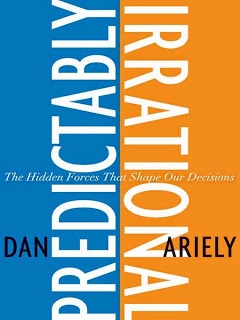
Dan Ariely is a professor of behavioral economics, the field that is trying to analyse economics via human behavior studies. In his book, Predictable Irrational - The Hidden Forces that Shape our Decisions, he is arguing that the simple model of market forces constraining people to behave rationally to maximize gain is false, as people are not rational and will never be rational. He then goes to explain various mental fallacies that we are subject to, complete with experiments testing and proving them.
The book is rather short and easy to read, split into 15 chapters and some annexes. Here is a summary:
Overall I found the book informative. If one can integrate the teachings of the book, the benefit for one's life would be great. Unfortunately, Ariely shows that this kind of rational illusions are predictable, and that people need to make great efforts to dispel them. I leave you with a video presentation from Dan Ariely on TED, just to give you a taste of what he is like and what he does.
[youtube:9X68dm92HVI]
 The Martian is a short and easy to read book about a guy being abandoned on Mars by mistake. Andy Weir writes most of the book as the astronaut's log entries, but in a colloquial and funny way. I started reading the book since there are a lot of people that praised it and there is also a Ridley Scott movie being made from the book. I hope it won't suck (*cough*Interstellar*cough*).
The Martian is a short and easy to read book about a guy being abandoned on Mars by mistake. Andy Weir writes most of the book as the astronaut's log entries, but in a colloquial and funny way. I started reading the book since there are a lot of people that praised it and there is also a Ridley Scott movie being made from the book. I hope it won't suck (*cough*Interstellar*cough*). Merry Christmas and a Happy New Year, all!
Merry Christmas and a Happy New Year, all! It was inevitable, both Naruto and Sasuke were getting ridiculously strong. In the end they fought the mother of all chakra and... of course they won, then they fought each other, but it was kind of underwhelming, since their power prevented any subtlety and they just went cowboy punching each other. The last color chapter is about how they leave it all to the next generation, although it is hard to think of anything more they could do to top their parents. I loved the entire series and it is easy to understand why: simple concept, positive feelings like friendship and camaraderie and weird magical ninja fights. I was a teen when I started watching the anime and now I am freakishly old. Well, life happens. After I got kind of tired of watching the anime, even if it was really well done and followed the manga faithfully, I went with reading the manga. I like to use Mangastream for my reading purposes, so you can read the entire thing here: Naruto Shippuden. Even if it appears they are writing some Naruto side stories, I am not sure I will ever read them. I am still looking for a manga that can grab me like Naruto has.
It was inevitable, both Naruto and Sasuke were getting ridiculously strong. In the end they fought the mother of all chakra and... of course they won, then they fought each other, but it was kind of underwhelming, since their power prevented any subtlety and they just went cowboy punching each other. The last color chapter is about how they leave it all to the next generation, although it is hard to think of anything more they could do to top their parents. I loved the entire series and it is easy to understand why: simple concept, positive feelings like friendship and camaraderie and weird magical ninja fights. I was a teen when I started watching the anime and now I am freakishly old. Well, life happens. After I got kind of tired of watching the anime, even if it was really well done and followed the manga faithfully, I went with reading the manga. I like to use Mangastream for my reading purposes, so you can read the entire thing here: Naruto Shippuden. Even if it appears they are writing some Naruto side stories, I am not sure I will ever read them. I am still looking for a manga that can grab me like Naruto has.  I was watching a video from GM Niclas Huschenbeth where he played lytura in an online game. Amazingly he lost, but that is what happens when you underestimate your opponent, which I think was what actually went wrong. At the end of the video it was difficult to see exactly what White could have done after a point, so I analysed the game with the computer and found some amazing moves. First I will show you the original game. I urge you to think it through and see what moves you would have done differently, like a chess puzzle, before you watch the game as the computer suggested it. You can also watch the video online at the end of the post and, if you like chess, I really recommend Huschenbeth's channel. Not only is he a great player, but also a decent and nice guy and young, too. His Blitz & Talk GM Special videos are especially cool, since he plays with other world class grand masters.
I was watching a video from GM Niclas Huschenbeth where he played lytura in an online game. Amazingly he lost, but that is what happens when you underestimate your opponent, which I think was what actually went wrong. At the end of the video it was difficult to see exactly what White could have done after a point, so I analysed the game with the computer and found some amazing moves. First I will show you the original game. I urge you to think it through and see what moves you would have done differently, like a chess puzzle, before you watch the game as the computer suggested it. You can also watch the video online at the end of the post and, if you like chess, I really recommend Huschenbeth's channel. Not only is he a great player, but also a decent and nice guy and young, too. His Blitz & Talk GM Special videos are especially cool, since he plays with other world class grand masters. I accidentally heard of the Wild Cards books a few weeks ago, but the concept fascinated me. The plot is that of an alternate America in which an alien virus caused massive deaths, but also strange mutations in 1946. The virus, something a bunch of aliens wanted to test on Earth as a bioweapon, kills 90% of its victims, mutates in horrible forms 9% of them, but also gives powerful abilities to but 1%. This 1% are called Aces, while the deformed ones are called Jokers, the analogy with a deck of cards giving the series its name. What is even more interesting is that this is like an open source literary universe, edited by George R. R. Martin, but in which a lot of writers are creating content. First book was published in 1987, and more and more were published and still are in the present. Some of them are collections of stories, some of them are full featured books; they all happen in the same universe, same heroes, and Martin is making sure they are ordered chronologically and have consistency. I found the concept intriguing.
I accidentally heard of the Wild Cards books a few weeks ago, but the concept fascinated me. The plot is that of an alternate America in which an alien virus caused massive deaths, but also strange mutations in 1946. The virus, something a bunch of aliens wanted to test on Earth as a bioweapon, kills 90% of its victims, mutates in horrible forms 9% of them, but also gives powerful abilities to but 1%. This 1% are called Aces, while the deformed ones are called Jokers, the analogy with a deck of cards giving the series its name. What is even more interesting is that this is like an open source literary universe, edited by George R. R. Martin, but in which a lot of writers are creating content. First book was published in 1987, and more and more were published and still are in the present. Some of them are collections of stories, some of them are full featured books; they all happen in the same universe, same heroes, and Martin is making sure they are ordered chronologically and have consistency. I found the concept intriguing.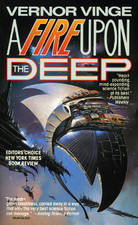
A Fire Upon the Deep is a really strange book. The writing style of the author, Vernon Vinge, reminds me a lot of Asimov: the describing of scenes that are clear in his head, but the willingness to move immediately over concepts or ideas that are not, the sometimes obnoxiously long dialogues, the direct way of saying it as it is. In fact, without knowing anything about Vinge, I bet that he is an engineer, maybe even a computer scientist. And I won. The concepts of the book range from high hard sci-fi to naive depictions of kilobyte per second communication. So, in all earnest, I thought the book was amateurish, meanwhile reading it from cover to cover in a few days, just like one of Asimov's books. Still, for a book written in 1992, it felt terribly outdated.
The plot is a combination of story arches. The main one is the emergence of an evil artificial intelligence that plans to take over the galaxy and the quest to retrieve the ultimate weapon that would defeat it. Then there is the story of a medieval alien race of rat-wolf analogues that think in packs, making an individual from several bodies acting together. And finally there is the internal dynamic of the group that embarks in this quest of quests. Some interesting ideas are being thrown around, but almost always with terrible naivete, such as the Internet Relay Chat type of communications between interstellar civilisations or the distinction of several Zones of the galaxy in which technology and space travel can work at various speeds. The alien creatures, in their vast majority, are badly described with embarrassing slip-ups like using the word "zombie" or some other typical human colloquialisms in an alien context, however some ideas are ingenious. I will list here the way the "tines" use ultrasonics to group think and act like singular entities, while being able to use sound for "interpack" communication. The way a soul of such a creature is affected by the death, addition, injury or indeed torture of one of the individual bodies is also explored, with various degrees of success. The creation or manipulation of an entire race of people in order to further the goals of a "godly" intelligence is also an interesting twist.
To sum it all up, from the three main story arches, the pack intelligence aliens one was the most thorough, while the one relating to AI and space travel and communication was the least. Amazing coming from a computer scientist. In fact, I would have liked the book more if its sole subject was about the accidental marooning of two children on a starship in the middle of a strange alien feudal world. The rest felt clunky and frankly completely ridiculous in most cases. I still read it with interest, although I don't intend to read anything else from Vinge.
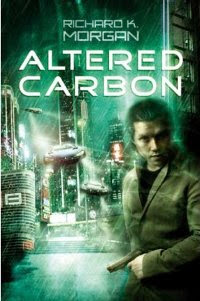
 The Windup Girl, acclaimed by many as a very good book, shows a Thailand that Paolo Bacigalupi declares as "a future version", but given scientific realities I would call it an alternate world Thailand. Wikipedia calls the book "biopunk", although I wouldn't quite call it that way, either, as the bio bits in the book didn't feel absolutely necessary to the story; more of an eco-thriller, perhaps. The book takes place in a nation that is fighting the encroaching ocean, in a time where global warming is rampant and sea levels have risen. Also, there is no more oil, no real use of electricity or combustion and everything revolves around genetics. Large elephant derivations are used to generate power; "kink-springs", a sort of mechanical energy battery, are powering just about everything; cats have been engineered to color shift to blend into their environment; human derivatives have been created, sterile, but beautiful and always healthy, slaves for things varying from military use to sex toys. But the most important element of this strange world is the overwhelming power of genetic companies. The same ones who created successful and copyrighted versions of food crops, they also released horrible diseases onto the world, making their products the only viable alternative and creating a depopulation incident.
The Windup Girl, acclaimed by many as a very good book, shows a Thailand that Paolo Bacigalupi declares as "a future version", but given scientific realities I would call it an alternate world Thailand. Wikipedia calls the book "biopunk", although I wouldn't quite call it that way, either, as the bio bits in the book didn't feel absolutely necessary to the story; more of an eco-thriller, perhaps. The book takes place in a nation that is fighting the encroaching ocean, in a time where global warming is rampant and sea levels have risen. Also, there is no more oil, no real use of electricity or combustion and everything revolves around genetics. Large elephant derivations are used to generate power; "kink-springs", a sort of mechanical energy battery, are powering just about everything; cats have been engineered to color shift to blend into their environment; human derivatives have been created, sterile, but beautiful and always healthy, slaves for things varying from military use to sex toys. But the most important element of this strange world is the overwhelming power of genetic companies. The same ones who created successful and copyrighted versions of food crops, they also released horrible diseases onto the world, making their products the only viable alternative and creating a depopulation incident.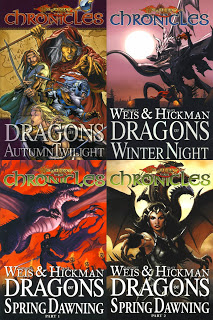
I met a few friends for a drink and they recommended to me (or rather seemed amazed that I had not heard of it) Dragonlance. I looked it up and, to my chagrin, found that it is a huge series with over 20 books and a lot of short stories - actually, in 2008 there where over 190 novels in the same universe. Resigned myself to read them all, I googled for the right order in which to read the saga and came up with Chronicles, which is a trilogy of books, as the correct starting point.
As in the story, there is balance between the good and the bad in my assessment of the books. For one, I will not read the rest of the books and waste a lot of my time, but for the other, I already start regretting reading the first three. You see, the entire plot seems to have the only purpose of supporting a canon of the classic fantasy genre that the writers have thought up.
Probably emerging from games of Dungeons and Dragons, like many fantasy universes, the world of Krynn has nothing remotely original. There are elves, humans, dwarves, goblins, dragons, pegasi, unicorns, centaurs, and other races like that. From the very first pages, you meet the heroes that form the quest party and they seem to have gathered all the possible cliches in the genre in their travels: the dwarf is old and grumpy and complains a lot, the half-elf is tortured by his double ancestry, the knight is rigid and honorable, the mage is tiny and frail and frustrated about it, his big (twin) brother is huge and completely non-magical, etc. In fact, the mage character is the only one which seems remotely interesting, all the other being busy posturing most of the time, like real size commercials for their D&D class and specialization.
But what I thought was the most offensive of all was the premise of the trilogy. Beware, here be dragons... and spoilers. Do not read further if you think you might want to read the books.
You see, the world has been reeling after a huge Cataclysm, a fiery mountain hitting the planet and causing havoc. At the end of the book we learn that the gods, in their infinite wisdom, did that because the world was too unbalanced towards good! And we learn this from the good god, who for the entire duration of the story just nudged our heroes in one direction or the other while the evil god was amassing armies and killing everybody. How is that for balance?
Even so, you can hardly complain about a book being cliché if you don't read more of the genre and, to be honest, except for a few books, I didn't really read much fantasy. So I had an opportunity to enjoy this, even if the writing was simplistic, the characterization almost non existent and the story bland. But there was something in the books that kept me at arms length from enjoying it. It finally dawned on me in the middle of the second book, when, after reading about the emotional turmoil of everybody, having the men pair with the women - unless they were there for comic relief, like the dwarf and the kender (which one could consider a pair, if I think about it) - and making chaste promises to one another (like not having sex until they can focus on the relationship and stuff like that)... after all that, I realized that Dragonlance was written by two women. (Even later I realized that one of the women was actually a man. Shame on me! The rest of the review stands)
I don't want to sound misogynistic here, I really wanted to read something cool written by women, but for a series entitled after a weapon - albeit something long and thin, with a thick bulbous appendage at the tip - the story was surprisingly devoid of any detailed battles, tactics, strategy or even decent brawls. The heroes are always running around, talking about their feelings or thinking about them and, in case there is a huge battle between the forces of good and evil, quickly skips forward to the conflict between the two women that love the same man.
Also, as if it all wasn't formulaic enough, no one really dies from the group, unless it is something that fulfills their purpose in life, while the support cast keeps perishing without anyone actually giving a damn. Check out the bit where an entire ship crew - including the woman captain and the minotaur second that I had read a lot about in previous pages - just die without the characters even remembering it. Or the battle of the knights with the dragon armies, where one phrase describes how the knights held, but half of them died. Just like that. I may have written more about that bit than there was written in the book.
To end this terrible rant, if you thought Wheel of Time was childish, as I did, this is worse. T'is true, the fair maiden that hath captured my heart and recommended the books hath read said scrolls of wisdom when she was 16, so that might explain her fond memories and my tortured journey towards the end of the story. I also really really wanted to believe that by writing more, the authors would become more skilled at it. It didn't seem to be the case. I refuse to read another dozen books just to keep the faith.
In conclusion, I cannot in good conscience recommend this to anyone, including children or young adults - to which I think the story would be tantamount to poison, teaching all the wrong lessons in the worst possible way. These books sucked lance!
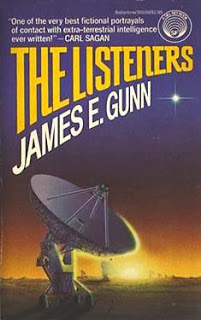 As always, this post will reflect my personal opinion. I know that The Listeners is a classic book, one that has been cited by SETI as a major factor in the project becoming known and supported by others. I know that at that time, doing a reasonable sci-fi book was a feat. I know that the writer was a believer in the contact with aliens and human nature and so on, and thus he must have been a nice guy, with similar desires to mine and other space-looking people. However the book annoyed me to no end.
As always, this post will reflect my personal opinion. I know that The Listeners is a classic book, one that has been cited by SETI as a major factor in the project becoming known and supported by others. I know that at that time, doing a reasonable sci-fi book was a feat. I know that the writer was a believer in the contact with aliens and human nature and so on, and thus he must have been a nice guy, with similar desires to mine and other space-looking people. However the book annoyed me to no end.
I was just thinking about Coma a few days ago. I don't know why. I thought I miss one of their beautiful songs. And here I see on YouTube they released a new video just when I was thinking of them. This one is a very nice combination of Catalin's lyrics, melodic and hard sounds and a cool interweave of the voices of Catalin and Dan - it's not the usual contrast between singing and shouting, but rather a vocal collaboration which works surprisingly well. Without further ado, here it is.
Chip, by Coma:
\
Also, if you want to see a live version:
 I've reached the last of the animes in the Studio Ghibli series that I wanted to watch (again) and it was nice that this one got to be the final one. You see, before that I had watched The Cat Returns and I rated it mediocre, so unlike the beautiful movies from the same collection. Whisper of the Heart seems to be the film designed to redeem it.
I've reached the last of the animes in the Studio Ghibli series that I wanted to watch (again) and it was nice that this one got to be the final one. You see, before that I had watched The Cat Returns and I rated it mediocre, so unlike the beautiful movies from the same collection. Whisper of the Heart seems to be the film designed to redeem it. I can't say that Neko no ongaeshi had a great effect on me. The animation was OK, the story was like a fairy tale, but it lacked something, a special feeling that I was expecting to have.
I can't say that Neko no ongaeshi had a great effect on me. The animation was OK, the story was like a fairy tale, but it lacked something, a special feeling that I was expecting to have.